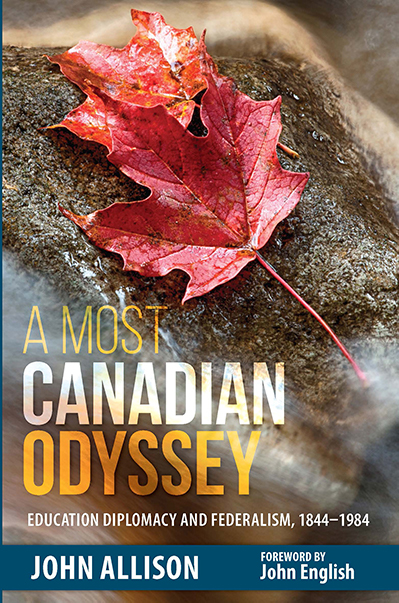New book for Dr. Allison

Congratulations to Dr. John Allison, associate professor in the Schulich School of Education, on the publication of his new book, A Most Canadian Odyssey: Education Diplomacy and Federalism, 1844-1984.
Contemporary Canadian education provides a critical lens for how we see ourselves as a civilization. Education diplomacy in current times broadens this vision, speaking to how we see ourselves on the global stage. Organizations such as the Alliance Française, the Fulbright Program, and the Confucius Institute speak volumes about the significant role education diplomacy plays in projecting countries’ education systems, languages, and cultures into the global arena. It is much more than that; it also comprises educational exchanges, conferences on educational issues, learning a language, or the signing of treaties and conventions that further education. Despite the fact that educational diplomacy is a critical aspect of diplomacy around the world, Canadians know very little about it and Canada has a poor record in the field. In fact, Canada’s presence internationally in this area is close to non-existent.
Drawing on historical research, Dr. Allison documents the history and development of educational diplomacy in Canada. In setting the stage, he looks at its early development via the voyages of Egerton Ryerson, the importance of education at Confederation, and developments in the early twentieth century leading up to the 1960s. The principal focus of the book, however, takes the reader through the 1960s, the rise of the Council of Ministers of Education, Canada (CMEC), the activities of Paul Gérin-Lajoie to extend Quebec’s jurisdiction in this area, and the federal response. With the Organization for Economic Cooperation and Development (OECD) Country Education Review in 1975-1976, Canada faced new challenges in this field. In his examination of the latter part of the 1970s, Allison analyzes the ongoing debates and discussions concerning who oversaw education diplomacy: Ottawa and the Department of Foreign Affairs (now Global Affairs Canada) or the provinces and CMEC. In the early 1980s, a Memorandum of Understanding between the provinces (as represented by CMEC) and the federal government was signed. Rather than addressing it in a dynamic fashion, this had the effect of mummifying the question. Canadian education diplomacy is a field in which all governments could do far better. With the history of this question in hand, leaders, governments, and Canadian educators can more effectively look anew at this issue and search for innovative and better approaches to Canadian-style education diplomacy.
